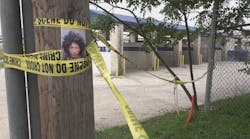Years ago, I was riding the desk at my old department when a young man came in and said he needed to file a missing persons report. I asked him a few questions and he told me that his wife had not come home the night before. As he described her to me, I knew exactly where she was: His description matched exactly the petite unknown woman found a few hours previously by the local sheriff's department. She had been murdered and left on the beach.
As it turned out, I was right. The dead woman was his wife, and it appeared the spouse had no hand in her killing. But it was one of those moments you don't forget - a little role in a larger tragedy.
During my law enforcement career, I took my share of missing persons reports. Most of them were runaway teenagers, drawn to other places after fights with their parents. Some were persons with diminished capacity who wandered off, were found and brought back to their homes. An unfortunate few met with foul play or were never heard from again.
My first missing person wasn't someone I came in contact with as a result of my job as a police officer. Instead, it was a girl with whom I attended high school.
My father was a Navy lifer, so I grew up on military bases. It was a good way to live - we moved often and I had no problem making myself at home wherever we went. When Dad received orders to Japan, I enrolled in Nile C. Kinnick High School, named for a famous college football player who died during World War II.
We called the school Yo-Hi because it was located in Yokohama. I had lots of good friends there and, because it was a small school, everybody knew everybody else.
One year behind me was a girl named Jeannette Kamahele. Thin, with long, black hair parted down the middle and of Hawaiian extraction, I saw Jeannette often in the halls. We weren't close friends, but we spoke and I liked her. She had dark, sparkling eyes and a reputation for being a happy, upbeat person.
Unlike schools stateside, the graduates and attendees of Department of Defense schools usually scatter to the four corners of the world once they graduate. So when it came time to engineer a reunion, former Yo-Hi students representing many different years came from all around the country.
One person was missing: Jeannette Kamahele. There were mentions in classmate chatter that she had disappeared years ago. But when I attended the reunion, I found out the details: She had gone missing in Sonoma County, after leaving Santa Rosa Community College, where she was a student.
Witnesses say they remember her hitchhiking and getting into a truck that day - April 25, 1972 - and from that point on, her whereabouts are a mystery. Some believe that Jeannette's body was found buried near that of a recovered murder victim, but officials say a dental comparison with the second set of remains yielded no match. As far as I know, Jeannette has never been found, and she has never been laid to rest.
There are a bunch of theories on the Internet: that she was a victim of Ted Bundy or the Zodiac Killer. Because there were a number of similar disappearances around the same time in that general area, officials have said there was most likely a serial killer operating in the region. But it's my understanding that the best-known of these, such as Bundy, have been ruled out as suspects in those cases.
I would like to tell you in some future column that Jeannette Kamahele has been located alive, but after all these years, that's an unlikely outcome. Her fate may remain an enigma and those who knew and loved her will never have closure.
Thousands of families have someone like Jeannette out there. They search everywhere, establish web sites, hire private investigators and dedicate their lives to their mission. Some are successful, but for the families of the missing who are not found immediately, the pain is a constant reminder that their lives are incomplete. I can’t imagine not knowing, but I also understand that law enforcement can do only so much with these cases. That is the reason I am blogging about people like Jeannette Kamahele.
It is my hope that by having a dialogue with others, ideas can be exchanged. The public will hopefully have a better understanding of how police do their jobs and the obstacles they encounter in cases like Jeannette's.
I hope to shine a light on new technology and scientific advances that will offer hope to those left behind still searching for their loved ones. I hope to answer questions about how these investigations work and assure the public that there is nothing investigators want more than to reunite them with their missing family member.
It is said that hope springs eternal. If my child were missing, I would not stop looking until I either found him or my last breath left my body. I am betting that there isn't a single cop out there who wouldn't say the exact same thing.


